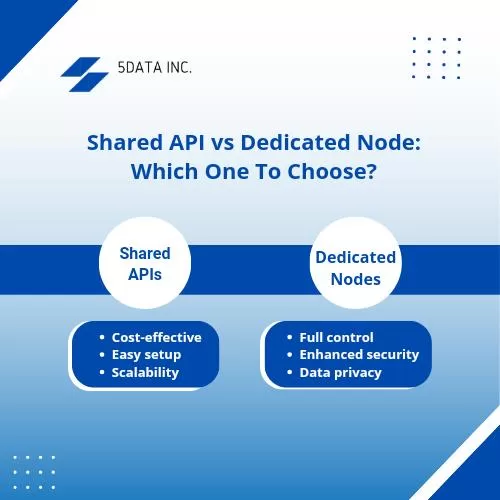When developing a decentralized application (dApp), one critical decision is determining the infrastructure required to interact with the blockchain nodes. This article explores the two options available: shared APIs and dedicated nodes.
We will delve into what nodes are, discuss different types of nodes, provide concise explanations for each type, compare shared APIs and dedicated nodes, and ultimately determine the best option for your dApp.
What we cover in this blog
What Are Blockchain Nodes?
The core of the Blockchain network, or nodes, are responsible for maintaining the ledger’s integrity and validating transactions. A transaction on the Blockchain is broadcast to all network nodes when it is made. Each node uses sophisticated algorithms to verify the transaction, and once there is agreement among the nodes, the transaction is added to the Blockchain. These enable decentralized applications to interact with the Blockchain, retrieve data, and submit transactions. Without nodes, blockchain networks would not be able to function.Types Of Nodes
a) Full Blockchain Node: Maintain a complete copy of the blockchain ledger and validate every transaction and block. These offer reliable infrastructure and decentralization of the dedicated machine. b) Light Nodes: Store only a fraction of the Blockchain’s data and rely on a full node to access the complete Blockchain. They sacrifice some security and decentralization for reduced storage and bandwidth requirements. c) Archive Nodes: Store the entire Blockchain’s historical data, allowing for deep analysis and retrieval of past transactions. They are often used for research or audit purposes. d) Master Nodes: Specialized RPC (Remote Procedure Call) nodes that provide additional functionality to the network, such as instant transactions or privacy features. They typically require a significant stake in the native cryptocurrency to operate.Dedicated Nodes
The RPC nodes, known as dedicated nodes, enable you to take advantage of shared API endpoints and advantages like ownership of a single node, complete decentralization, extremely efficient RPC calls, and much more. The RPC calls become more effective and incredibly simple with an added layer of security and reliability for connecting to blockchain infrastructure because the node endpoints are only accessible to you. Organizations needing an extra layer of security and total control over their communication with the blockchain networks should utilize their own dedicated node for the system. Reliability is crucial for advanced web3 dApps, exchanges, and sophisticated DeFi apps because they frequently access blockchain data and carry out large transactions. The most common RPC nodes that enable dApps to retrieve, broadcast, and execute transactions directly from the node without using a block explorer are known as full nodes.Pros of Dedicated Nodes:
- Full control: Developers have their own dedicated node giving them full control, allowing the formation of a peer-to-peer network.
- Enhanced security: By managing the dedicated RPC nodes, developers can implement security measures to the transactional data, reducing the risk of external attacks and malicious public nodes.
- Data privacy: With dedicated nodes, sensitive data generated by the dApp can be kept private and not make it as a shared node.

Shared APIs
The shared RPC endpoint, known as shared APIs, enables multiple users to request data from a single RPC node configured and maintained by node service providers. The word “shared” implies that numerous applications may simultaneously access the same API and make data requests. These APIs are shared, but the general public cannot use them. Instead, these are made accessible to a select group of users or programs permitted to access the endpoints. These API endpoints give developers authorized access to RPC endpoints. They can use APIs to communicate with different blockchain networks to query, retrieve, and share data, such as transactional information, and deploy smart contracts and other blockchain-powered assets. Businesses that rely on blockchain data have the option of connecting to shared API endpoints, but their needs are generally smaller. To meet the changing requirements for development, dApps should ideally use developer APIs that extend their current API support to new, emerging blockchain networks.Pros of Shared APIs:
- Cost-effective: Shared APIs eliminate the need to set up and maintain dedicated infrastructure, reducing operational costs.
- Easy setup: Developers can quickly integrate the API into their dApp without the complexities of node management.
- Scalability: Shared APIs offer scalable solutions by giving an API key to communicate with a robust infrastructure to manage them.
Shared API vs Dedicated Node: Which One To Choose?
The decision between shared APIs and dedicated RPC nodes depends on various factors such as the specific needs of your dApp, budget, technical expertise, and desired level of control. Choose Shared APIs if:- Cost-effectiveness and quick setup are a priority.
- You have limitations to access data or technical expertise.
- You prioritize scalable infrastructure over customizability.
- Full control, unlimited requests, and data privacy are critical.
- You have the necessary resources and technical expertise to set up and maintain your infrastructure.
- You require higher security measures and independence from third-party providers.
Key Takeaways
We have gone through the two best options; ultimately, it depends on your project requirements and scalability. As for how 5data Inc. can help with these infrastructures and services? As a Best Application Development Services in the USA, we can offer assistance with Infrastructure consultation, Shared API integration, Ethereum node setup, Infrastructure management, and Custom infrastructure development. In summary, we can guide you in choosing the right infrastructure option, whether shared APIs or dedicated nodes, and provide the necessary expertise and services to ensure your dApp’s infrastructure is robust, scalable, and optimized for performance.
About the Author...
Almaas Saleem is a skilled software engineer from Kerala, India who currently resides in East Africa. She is passionate about technology and constantly seeks to learn more about it through reading and hands-on experience. Almaas excels in web development, design, automated testing software, ethical hacking, cybersecurity, and digital marketing. She also works as a technical writer for new businesses, managing various entities. Almaas is distinguished by her steadfastness and commitment to her work, which consistently yields excellent results.
